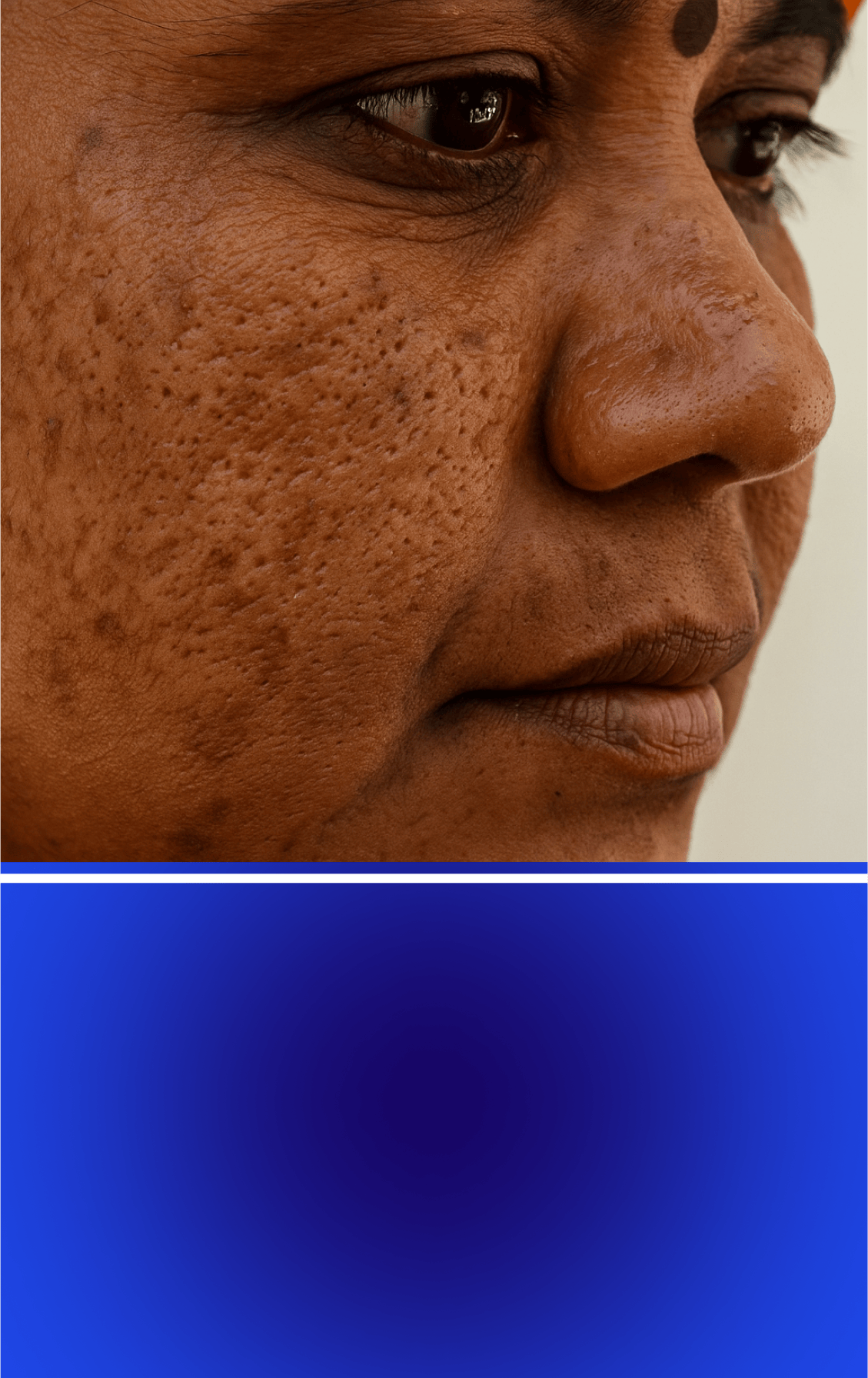Many people across India quietly face common skin concerns like dryness, acne, sensitivity, and early signs of ageing. These issues can affect not just your skin’s health but also your confidence and day-to-day comfort. With so many products and conflicting advice available, it’s easy to feel overwhelmed and unsure about what skincare routine truly works.
Dermatologist-recommended skincare offers a reliable way through this confusion. Backed by medical expertise and clinical experience, expert guidance helps you build a simple yet effective routine specific to your unique skin needs.
This article shares dermatologist-approved skin care tips and practical steps to help you attain and maintain healthy, radiant skin, irrespective of your skin type or concern.
Overview
- Expert skin care dermatologist tips to simplify your daily routine and enhance skin health.
- How to customise cleansing, moisturising, and sun protection based on your skin type.
- Practical troubleshooting strategies for common issues like irritation, breakouts, and dryness.
- Lifestyle habits that can improve your complexion and maintain healthy skin long-term.
- Professional advice to prevent premature ageing and achieve clearer, more radiant skin.
Why See a Dermatologist?
Exploring the world of skincare can be confusing, especially with so many products and trends flooding the market. Consulting a dermatologist provides several key advantages that go far beyond what general beauty advice or over-the-counter products can offer.
The Benefits of Expert, Personalised Assessment
- Accurate Diagnosis: Dermatologists are trained to identify your skin type and recognise underlying issues that may not be obvious, such as early signs of eczema, rosacea, or sun damage.
- Targeted Treatment Plans: Experts recommend products and routines tailored to your unique needs, whether you have oily, dry, combination, or sensitive skin, or specific concerns like pigmentation and acne.
- Prescription-Strength Solutions: For problems that don’t respond to standard products, dermatologists can prescribe effective medicines or clinical therapies that deliver better and safer results.
- Preventative Guidance: Dermatologists help you understand lifestyle habits, environmental factors, and skin changes due to age or climate, so you can adjust your routine before problems arise.
How do Dermatologists Personalise Skincare?
- Age-Specific Advice: Skincare needs differ from teenage years to adulthood and beyond. Dermatologists adapt routines for hormonal changes, environmental stresses, and ageing.
- Ongoing Support: Regular check-ups mean your routine can evolve as your skin does, preventing new issues and optimising long-term health.
- Professional Treatments: For persistent or severe issues, dermatologists may offer clinical options such as chemical peels, lasers, or medical facials, which are safer and more effective under expert care.
Now that you understand the value of seeing a dermatologist, let’s break down the essential steps of a daily skincare routine.
The Essentials of a Dermatologist-Approved Daily Routine
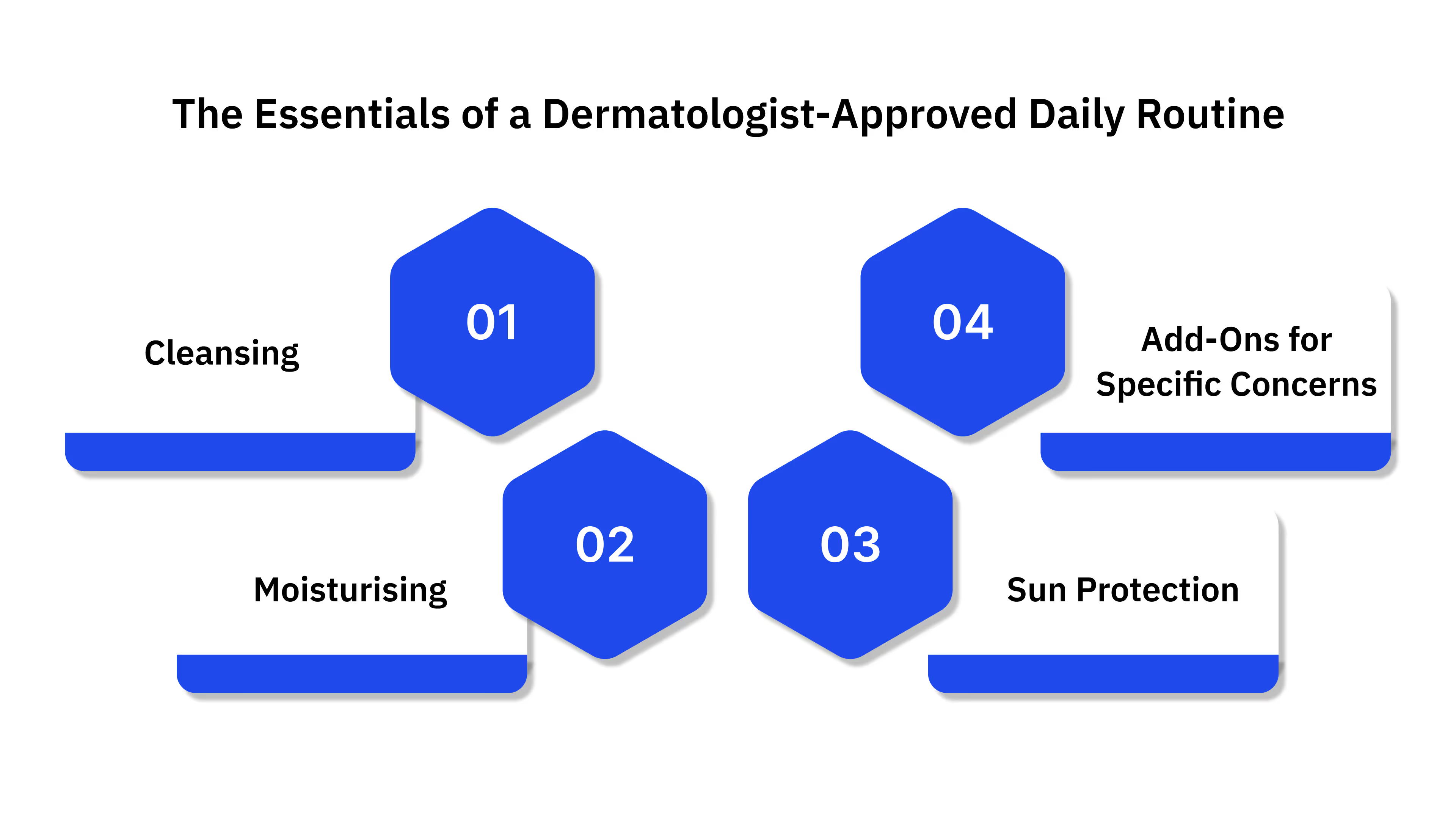
A simple, consistent skincare routine is the foundation of healthy skin. Skin care dermatologists recommend focusing on a few core steps each day, tailored to your skin type and personal needs.
1. Cleansing
- Gently washes away dirt, oil, and impurities without stripping natural moisture.
- Select a mild, fragrance-free cleanser tailored to your skin type, such as gel or foam for oily skin and cream or lotion for dry or sensitive skin.
- Cleanse your face two times daily (morning and evening), and always after heavy sweating.
- Avoid harsh scrubbing or using hot water, which can irritate or dry out the skin.
- For acne-prone or sensitive skin, opt for gentle, pH-balanced cleansers to prevent flare-ups.
2. Moisturising
- Maintains skin hydration and strengthens the protective barrier.
- Pick a moisturiser that works for your skin type: lightweight, oil-free lotions for oily skin; richer creams for dry skin; hypoallergenic formulas for sensitive skin.
- Apply moisturiser right away after cleansing, while the skin is still little damp, for best absorption.
- Even oily and combination skins needs it, as skipping this step can trigger increased oil production.
3. Sun Protection
- Shields the skin from UV damage, premature ageing, and reduces cancer risk.
- Use a broad-spectrum sunscreen with SPF 30 or higher every morning, even on cloudy days or indoors, as UVA rays can penetrate windows.
- Apply generously to all exposed areas at least 15 minutes before heading out. Reapply every 2 hours if outdoors, or after sweating/swimming.
- For added defence, wear protective clothing, sunglasses, and hats when exposed to strong sunlight.
4. Add-Ons for Specific Concerns
- Serums:
- Vitamin C for antioxidant protection and brightening.
- Hyaluronic acid for extra hydration.
- Retinol or retinoids (night use only) for anti-ageing and acne.
- Spot Treatments:
Use targeted products containing ingredients like benzoyl peroxide or salicylic acid for breakouts. - Prescription Products:
For persistent issues like pigmentation, severe acne, or eczema, follow your dermatologist’s advice and prescribed products.
Now, let’s understand the safety aspects, potential risks, and who should avoid recommended skin care practises.
Dermatologist Recommended Dos and Don’ts
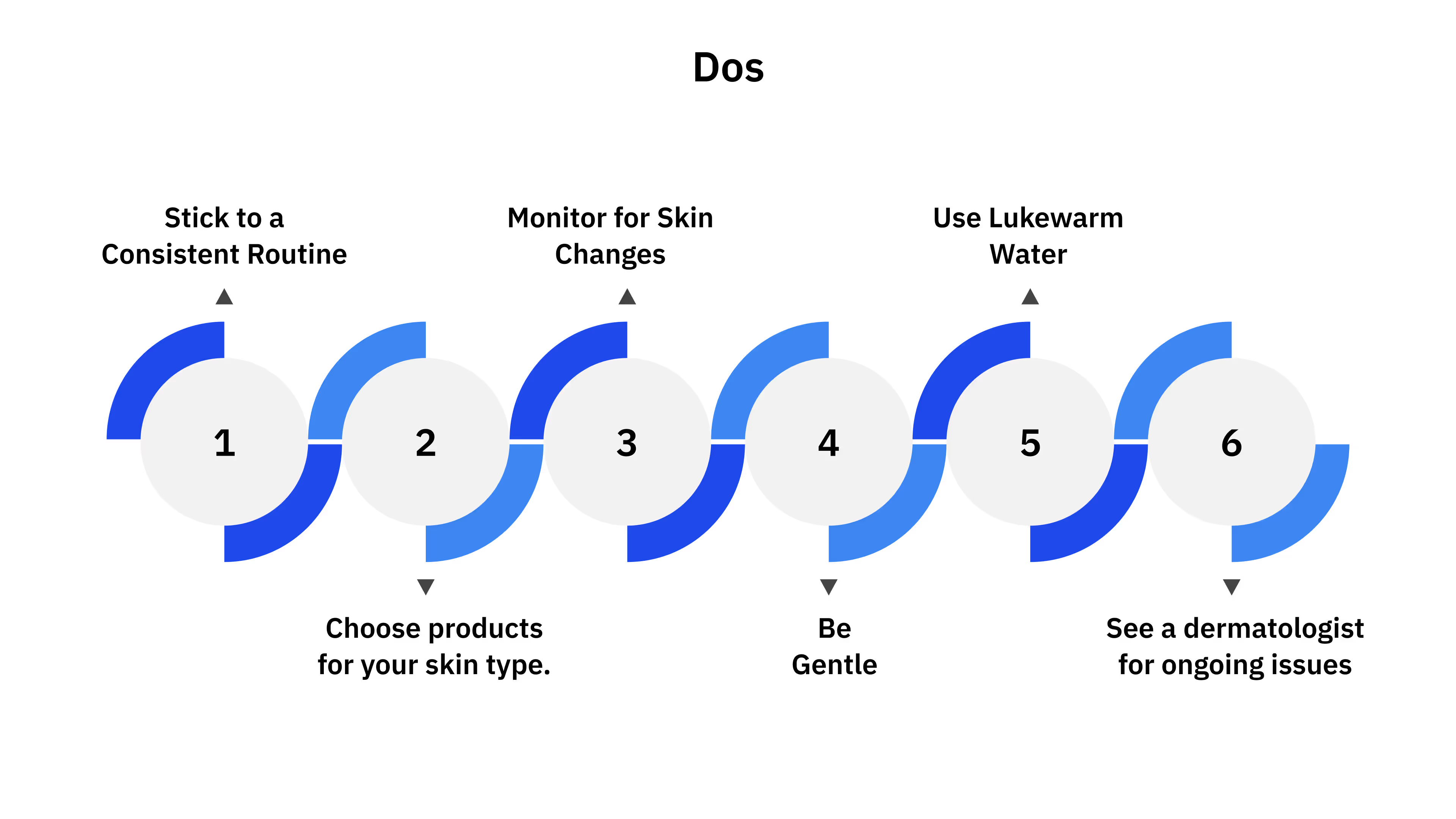
Building an effective skincare routine involves more than just following steps; it’s also about following key principles endorsed by skin care dermatologists. Here’s what dermatologists consistently advise you to do and what to avoid for the best skin health.
Dos
- Stick to a Consistent Routine: Maintain both morning (AM) and evening (PM) skincare habits for ongoing benefits, even on busy days.
- Pick Products Suitable for Your Skin Type: Whether your skin is oily, dry, combination, or sensitive, always select cleansers, moisturisers, and treatments specifically designed for your skin.
- Monitor for Skin Changes: Regularly check your skin for new spots, moles, or changes in existing ones. Early identification helps detect potential issues before they become serious.
- Be Gentle: Use gentle movements when applying products. Pat dry your face using a soft towel; never rub vigorously.
- Use Lukewarm Water: Hot water can take away natural oils, leading to dryness or irritation.
- Consult a Dermatologist for Persistent Concerns: If over-the-counter solutions don’t resolve your issues or if you have chronic skin problems, professional assessment and prescription therapies are best.
Don’ts
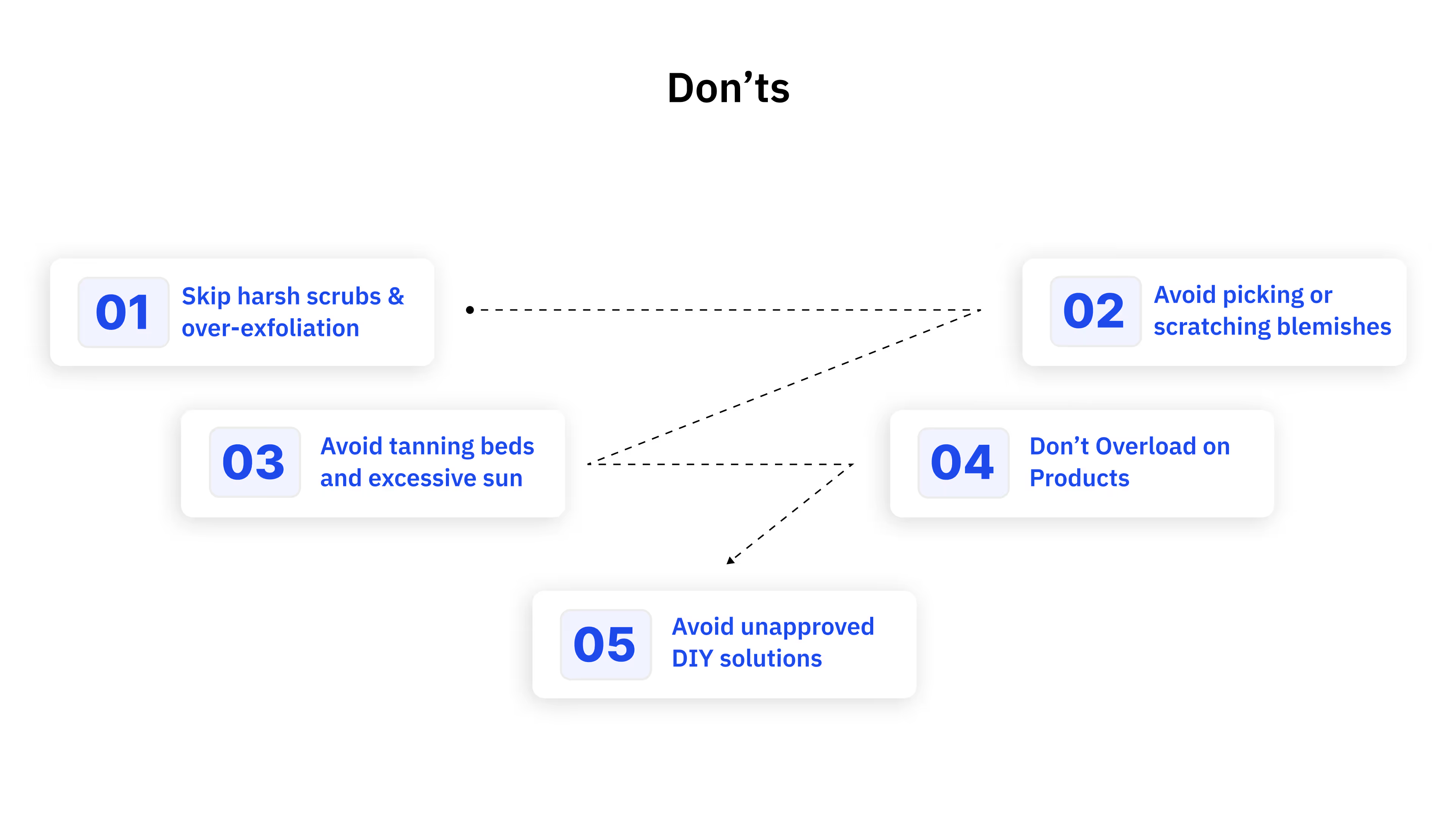
- Avoid Harsh Scrubs and Over-Exfoliation: Physical scrubs or frequent exfoliation can damage your skin barrier, causing redness, irritation, or sensitivity.
- Don’t Pick, Squeeze, or Scratch Blemishes: Picking at spots can increase inflammation and infection risk and may lead to scarring or pigmentation issues.
- Steer Clear of Tanning Beds and Excessive Sun: UV exposure speeds up ageing and increases the risk of skin cancers—sunscreen and physical sun protection are vital.
- Don’t Overload on Products: Using too many active ingredients or changing products too quickly can confuse or stress the skin, resulting in breakouts or irritation.
- Avoid DIY Solutions Not Recommended by Experts: Some home remedies and trends may seem tempting, but can cause more harm than good. Always check with a dermatologist before trying new regimens.
Now, let’s understand how to adapt your skincare regimen depending on your age and skin type for best results.
Adapting Your Skincare Routine to Skin Type and Age
Everyone’s skin has unique needs influenced by genetics, environment, age, and lifestyle. Tailoring your routine ensures you achieve the best results for your current skin concerns, whatever your stage of life.
Now, let’s explore simple lifestyle habits recommended by dermatologists that support your daily skincare routine and overall skin health.
Key Lifestyle Tips from Dermatologists
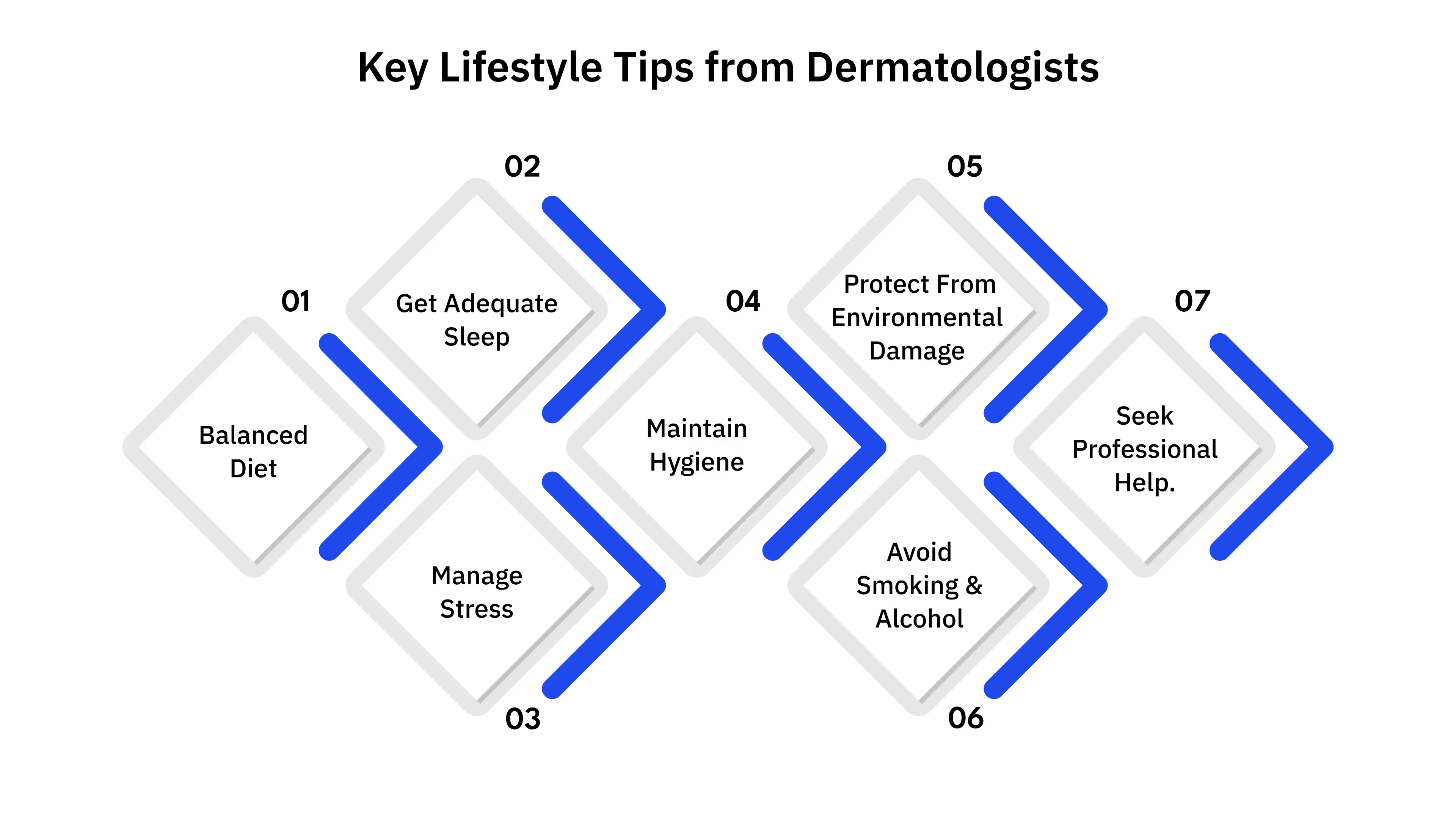
Adopting healthy lifestyle habits can greatly enhance the impact of your skincare routine and promote long-term skin health. Dermatologists consistently recommend the following practices to support clear, glowing skin every day:
1. Balanced Diet
Eating a nutritious and balanced diet provides essential nutrients that support healthy, glowing skin.
- Include a lot of fruits and vegetables rich in antioxidants to protect skin cells.
- Consume healthy fats from foods like nuts, seeds, and fish to maintain the skin’s barrier function.
- Drink sufficient water throughout the day to keep skin hydrated and flush out toxins.
2. Get Adequate Sleep
Quality sleep is vital for your skin to repair and regenerate effectively overnight.
- Try for 7 to 9 hours of sound sleep each night.
- Recognise that poor sleep may worsen conditions such as acne and a dull complexion.
3. Manage Stress
Controlling stress levels can have a significant positive impact on your skin’s appearance and health.
- Chronic stress can trigger or intensify skin problems like acne and eczema.
- Practice relaxation techniques such as meditation, yoga, exercise, or mindful breathing regularly.
4. Maintain Good Hygiene
Proper hygiene helps avoid the buildup of bacteria and reduces the risk of skin infections.
- Wash pillowcases, makeup brushes, and towels frequently to minimise bacteria.
- Avoid sharing personal skincare items and towels to prevent cross-contamination.
5. Protect from Environmental Damage
Taking preventive measures against pollution and sun exposure reduces skin damage and ageing.
- Cleanse your face thoroughly after outdoor exposure to remove pollutants and dust.
- Use protective clothing and accessories like hats or scarves when in the sun or dusty environments.
6. Avoid Smoking and Limit Alcohol
Lifestyle choices such as nicotine consumption and excessive alcohol intake negatively affect skin health and ageing.
- Smoking accelerates skin ageing and slows down the healing process.
- Excess alcohol consumption leads to skin dehydration and can worsen conditions like rosacea.
7. Know When to Seek Professional Help
Recognising when to consult a dermatologist ensures proper treatment of persistent or unusual skin conditions.
- Schedule visits if you have ongoing skin concerns or notice unusual changes.
- Regular professional check-ups allow for timely intervention and personalised adjustments to your skincare plan.
With these lifestyle habits supporting your skincare routine, let’s now look at a simple sample AM/PM skincare routine you can follow daily for healthy, radiant skin.
Sample AM/PM Skincare Routine Table
Below is a simple, dermatologist-recommended daily skincare routine you can personalise, focusing on your skin type and needs. Consistency is key; morning and evening routines protect and nourish your skin around the clock.
Tips for Personalising Your Routine:
- Oily skin: Choose oil-free, non-comedogenic products.
- Dry skin: Use nourishing creams; consider adding a hydrating mask at night.
- Sensitive skin: Stick to minimal, fragrance-free products and patch-test new additions.
- Reapply Sunscreen: Always reapply sunscreen during the day if exposed to sunlight.
Conclusion
Skincare is a journey that blends scientific insight with personalised care to help you achieve your healthiest, most radiant complexion. By embracing skin care dermatologist approved routines, tailoring your approach to your unique skin type and age, and supporting your skin through smart lifestyle choices, you empower natural skin renewal and lasting vitality.
At Velantis Dermatology, we combine evidence-based dermatology with compassionate, customised guidance to help you tackle your skin concerns confidently. Whether addressing acne, ageing, sensitivity, or pigmentation, our expert team is dedicated to delivering treatments and advice rooted in science and designed for real-world results.
If you are seeking an expert, evidence-based skin care dermatologist who integrates clinical treatments with aesthetic solutions, Velantis Dermatology is ready to assist you.
Established by Dr. Janani Sree CM (MD, Dermatologist), our clinic stands firmly on the principles of ethics, professionalism, and lasting trust.
Discover the perfect blend of scientific expertise and cosmetic excellence. Schedule a consultation with Velantis Dermatology today and take the first step toward achieving healthier, more radiant skin.
Frequently Asked Questions (FAQs)
Q1: How long before I see results from a new skincare routine?
A1: Most people notice some improvement within 4 to 6 weeks when using products consistently. However, treatments targeting acne, hyperpigmentation, or fine lines may require up to 12 weeks for significant results. Immediate effects such as improved hydration or softer skin can sometimes be noticed right away after applying a good moisturiser.
Q2: Can I use active ingredients like retinol, vitamin C, or acids together?
A2: Some active ingredients can be combined safely, but others should be used separately to avoid irritation. Vitamin C is generally recommended for morning use, while retinol is reserved for nighttime. It’s best to introduce one new active ingredient at a time and monitor your skin’s response. Consulting a dermatologist for personalised advice is recommended.
Q3: Is it necessary to double cleanse at night?
A3: Double cleansing (using both oil-based and water-based cleansers) is helpful to thoroughly remove heavy sunscreen, makeup, or pollution. However, if you wear minimal or no makeup and sunscreen, a gentle single cleanse may be sufficient.
Q4: What order should I apply skincare products?
A4: The general rule is to apply products from the lightest to the thickest consistency: start with cleanser, then treatment serums, followed by moisturiser, and finish with sunscreen in the morning. This helps each product absorb properly and work effectively.
Q5: How can I build a routine on a budget?
A5: Focus on the core essentials: a good cleanser, moisturiser, and sunscreen. Affordable drugstore or generic brands can be effective if well formulated. Skip expensive extras unless you have specific skin concerns that need specialised products.
Q6: What should I do if over-the-counter products aren’t working for me?
A6: If your concerns persist despite OTC products, consult a skin care dermatologist. Persistent issues like severe acne, eczema, or unexplained skin changes often require prescription treatments or professional care for the best results.


.png)
